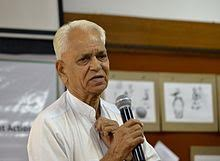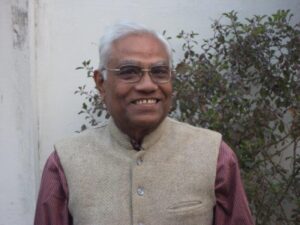BIMS Patron

Mr. Salem Nanjundaiah Subha Rao
( 2017 – 12th August 2021 )
Mr. Salem Nanjundaiah Subha Rao commonly known as S. N. Subha Rao.
Mr. Rao was born in Bangalore, Karnataka India on 7th February 1929 .He was Advocate of repute, known for refusing unjust Cases.
While studying in the school he was inspired by the teaching of Mahatma Gandhi.His first experience with India’s freedom movement was on the morning of 9 August 1942 ,when he along with other school students boycotted classes. He was writing “Quit India ” on street walls and roads when he was arrested by the British Police but was later released being only 13 year’s of age .Since then Mr. Rao became active in freedom struggle of the country. He continued his activities from 7, Jantar Mantar road New Delhi till 1970, organizing youth Camps all over India with tremendous success & popularity amongst youth men & women. His abilities won him the affection of Shri Jawaharlal Nehru, Shri K. Kamraj and several other National leaders.
He became a life time member of “Gandhi Peace Foundation ” He is the most senior Mediator of the world.
He is a recipient of several international and nation awards. These includes the D.Lit. Honoured Degree by Kashi Vidhya Peeth – 1995, Vishva Manvadhikar Protsahan Puruskar – 2002, Rajiv Gandhi National Sadbhavana Award – 2003, Mahatma Gandhi Puruskar – 2008, Rashtriya Sadbhawna Ekta Prusaskar-2014 Nagpur, Maharashtra.

Sharad Chandra Behar
( 13th August 2021 – Continue )
Sharad Chandra Behar was born on 31st of January 1939 at Sarangarh, then a tiny Princely state comprising only 84 villages, in a predominantly tribal area, where he spent his formative childhood and also had his school education.
With this rural background, Sharad Chandra Behar joined the Indian Administrative Service in 1961. The elite service failed to erase the strong imprint of the rural culture and communitarian way of life and deep connect with, and love for, the people, particularly the deprived and disadvantaged. This was further reinforced by his experience of working as District Magistrate during the very early part of his career, in two very backward and predominantly tribal Districts, one of which was suffering from acute famine for 3 years in a row, when India was highly food deficit and depended upon imports. Trying to serve, in the best possible way, the starving, helpless and voiceless in these difficult conditions, made him realize his own helplessness in a system dominated by politically influential that ignores the real need of the depressed.
The insight into the inherent injustice, leading to inequality, deprivation, and oppression, in the present social order made him take up social change as his mission.
His approach to governance was thereafter based on the firmly and unwaveringly held belief that the love for, and trust of, the people, irrespective of artificial boundaries— whether of religion, caste, colour, creed, race, nationality, gender or any other—is the highest value and therefore constantly remining in intimate touch with, the pulse—needs, aspirations, feelings and desires– of the people particularly the voiceless and oppressed, is the sine-qua-none of all aspects, and all stages of good governance, he continued to keep in close touch with the people, even when he arrived at the pinnacle of the permanent executive, the Chief Secretary of the undivided state of Madhya Pradesh, before his superannuation in 1997, by touring frequently and extensively interacting with the marginalized and oppressed people, particularly in rural areas.
With social transformation as his mission, Indian Administrative Service as a source of livelihood and a powerful platform for pursuing his mission and passion, Sharad Chandra Behar, has been simultaneously engaged in administration, activism, and academics. He has been passionate about education as an agent of social change , development of the deprived and marginalized, democratic decentralisation on the lines of Gandhi’s Gram Swaraj, and broadly about Gandhian philosophy and vision.
He, accordingly, has held, by choice, all important positions, considered unglamorous in the government structure, — in the department of education and those concerning the development of the scheduled tribes, the scheduled castes and other backward classes, and labour welfare.
He is the founder Vice Chancellor of Guru Ghasi Das University, Bilaspur (1983 – 87), which is now a central university.
He also served as Vice Chancellor of Makhanlal Chaturvedi National University of Journalism, Bhopal (1999 – 2004), of which the Vice President of India was the visitor.
Always conscious of the limitations of the government system, he has been associated with and supportive of important people’s movements, organisations in the voluntary sector and struggles on behalf of the deprived and marginalized. Being both part of the government and the people’s struggles, he was able to act as a bridge between the two, enabling both to understand each other avoiding confrontation and often, not always, leading to constructive collaboration in the larger interest of the people.
He has written extensively on education, public administration, decentralisation, and on various issues of social concern. He is co-author of a book in Hindi on Education, Society and Establishment. He has edited a book on globalisation and education entitled ‘Globalising Education: Perceptions and Processes’. Currently he is working on the life and educational ideas of JP Naik, and the book is in the process of publication.
He has been chief editor of a Journal for school -teachers for 20 years, and of a Journal on public administration in Hindi, in association with Indian Institute of Public Administration New Delhi for five years.
He has been chairperson or a member of several important national and state committees on education and social issues like land, rehabilitation, large dams, empowerment of women, child rights et cetera and served as a jury for awards for outstanding social work.
He has been engaged in Macro level policy formulation, project planning, research, writing, advocacy and grassroot implementation which he has pursued incessantly and innovatively adopting an inclusive, holistic and eclectic approach.
The seamless interpenetration of the three domains of his work has enabled him to play the role of an activist and academic within administration, to influence his civil society activism with a blend of intellectual perspective and insider’s insight about the State and to imbue his writings with the sensitivity of volunteerism and the holistic perspective developed in administration.
Always a rebel, he has been constantly challenging – – in thought and action – – established order – social, political, economic, administrative, religious, intellectual et cetera on the strength of clear-cut alternative visions supported often with concrete strategies and plan of action.
He holds a Master’s degree in Psychology from the University of Jabalpur and a Post Graduate Diploma in Development Studies from Cambridge University, United Kingdom.
Currently, in addition to being closely involved with several social movements, people’s movements and civil society organizations, he is currently Chair/President of the following organisations:
-
1. Digdarshika, working for the mentally and physically challenged.
2. Carmdaksh, working in the tribal areas of Chhatisgarh for the empowerment of the people and rural development.
3. Centre for Experiencing Socio-Cultural Interaction, Madurai, working for organizing socio[1]cultural interactions, rural development, women empowerment, education and empowerment of the youth and allied activities.
4. Aide-et Action, working for changing the world through education in its widest sense.
This is an international organization. He is the President of the India board and member of the South Asia board.
He is also serving as a Director in the Board of Directors of Azim Premji Foundation, working in the area of education, health, livelihood, governance, women empowerment and other facets of social change and welfare.
He is also a trustee of Disha Foundation, running an innovative community school that focuses on experiential learning.
” Sharad Behar is a former civil servant, former Vice[1]Chancellor. With a rural background of a predominantly tribal area, Sharad Chandra Behar was born on 31st of January 1939 at Sarangarh, then a small princely state where he had his school education.
He joined the Indian Administrative Service in 1961 and superannuated in 1997. He has been passionate about education, development of the deprived and marginalized, and democratic decentralisation. Sharad Behar is a former civil servant, former Vice-Chancellor, Founder-Director of Eklavya.
Sharad Chandra Behar was born on 31st of January 1939 at Sarangarh then a small princely state where he had his school education.
He joined the Indian Administrative Service in 1961 and superannuated in 1997. He has been passionate about education, development of the deprived and marginalized, and democratic decentralisation. He has held all important positions in the educational hierarchy of the government and the departments concerning development of the scheduled tribes, the scheduled castes and other backward classes.
He is the founder Vice Chancellor of Guru Ghasi Das University, Bilaspur (1983 – 87), which is now a central university.
He also served as Vice Chancellor of Makhanlal Chaturvedi University of Journalism, Bhopal (1999 – 2004), of which the Vice President was the visitor.
Always conscious of the limitations of the government system, for the last four decades he has been associated with and supportive of important people’s movements, organisations in the voluntary sector and struggles on behalf of the deprived and marginalized. Being both part of the government and the people’s struggles, he was able to act as a bridge between the two.
He has written extensively on education, public administration, decentralisation, and on issues of social concern. He is co-author of a book in Hindi on Education, Society and Establishment. He has edited a book on globalisation and education entitled ‘Globalising Education: Perceptions and Processes’. Currently he is working on the life and educational ideas of JP Naik, and the book is in the process of publication.
He has been chief editor of the Journal for school teachers for 20 years and of the Journal on public administration for five years.
He holds a Master’s degree in Psychology (1961) from the University of Jabalpur and a Post Graduate Diploma in Development Studies from Cambridge University, (1976), UK.
He is currently Chair of three organisations:
1.Indian Institute of Education, Pune, established by the renowned educationist JP Naik, focusing on multidisciplinary research in education and social sciences.
2.Digdarshika, working for the mentally and physically challenged;
3.Carmdaksh, working in the tribal areas of Chhatisgarh for the empowerment of the people and rural development.
“Sharad Behar is a former civil servant, former Vice[1]Chancellor, Founder-Director of Eklavya, struggling for more than four decades for educational transformation at all levels, experimenting and innovating from pre-primary to university, working both inside the government and outside, and intervening at policy- formulation to grass-root action and still struggling……… He has been writing on education and other issues of social concern based on his actions and reflections.”